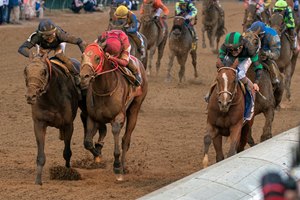What's Going on Here: Not Seeing the Light


Moments after the Kentucky Derby (G1), I turned to a Twitter-happy reporter next to me and encouraged her to wait a few moments before posting the order of finish, because in watching the race live I observed an incident that clearly warranted review.
I assumed the inquiry sign would light up about the same time the final horse reached the wire. But it stayed dark for a minute, and then several minutes…
These were the initial moments after the 2019 Derby. Unfortunately, they also could describe the initial moments after the 2024 Derby.
Five years after the confusion of 2019—caused in part by the Kentucky stewards initially not hanging the inquiry sign despite an incident that obviously warranted review—they still have not learned their lesson.
In 2019 some jockey objections after Maximum Security 's erratic shift in lanes near the five-sixteenths pole that forced War of Will jockey Tyler Gaffalione to check hard and nearly fall from his mount ensured a review of the incident. After a delay of more than 20 minutes, Maximum Security would be demoted from first to 17th.
This year Sierra Leone and Japan's Forever Young repeatedly bumped each other as the former, under Gaffalione, appeared to move in several paths from early stretch to the finish. At the wire Sierra Leone edged Forever Young by a nose for second. The close margin is important because interference penalties kick in when it potentially costs a horse a better placing.
Surely there would be a review.
But the minutes ticked by with no inquiry.
No objection.
Soon after the three-horse photo sorted the order of finish, "official" lit up.
Then social media lit up as well, questioning why there was no inquiry in a race where there was a $500,000 difference in purse money for second and third and untold millions of wagering dollars affected by that outcome. Yes, such high-stakes calls are always going to carry controversy, but the Kentucky stewards are not helping matters by rarely lighting the inquiry sign.
In the five years since the Maximum Security decision, the Kentucky stewards still have not grasped that the way you communicate to the public that an incident is being reviewed is to post the inquiry sign.
In 2019, where I think the stewards ultimately made the right call in demoting Maximum Security, their failure to not instantly post an inquiry—instead kicking that review into gear after objections from jockeys on horses who were not even the most affected by the incident—contributed to the confusion and uproar.
This year, they again failed to post an inquiry, and this time, there was no objection. The race stood, with much of the public wondering why so much bumping was not reviewed. Cue the confusion. Cue the uproar.
Predictably, a statement would follow—some 42 hours after the race.
"The stewards review every race in Kentucky live and by video replay before posting it official and they followed the same procedure for the 150th running of the Kentucky Derby. After conducting their standard review of the race, determining no further review or investigation was necessary to conclude there were no incidents that altered the finish of the race, and seeing there were no objections filed, the stewards posted the Kentucky Derby official."
Here's the thing: racing already has a way of instantly communicating the statement above and it is simpler than 73 words nearly two full days after the race. It is flashing a single word, "inquiry," moments after the finish. Now, the thousands in attendance and millions watching on television, computers, and mobile devices know you are reviewing the incident. Hey, you can even flash the numbers of the horses involved!
Beyond that, it is hard to believe any stewards who saw that race would see the stretch incident between Sierra Leone and Forever Young as nothing more than a "standard review." The statement above basically concedes that they did not thoroughly review the incident—only a standard review.

Throwing in the language of "seeing there were no objections filed," also is very telling. A big, big problem with Kentucky's current approach is it heavily relies on the connections to file objections. When no objections are filed, it should not be viewed as evidence that there are no incidents worth in-depth review.
There are a number of reasons why competitors might not object. In 2019, War of Will trainer Mark Casse noted that even though his horse was the most affected by Maximum Security's interference, filing an objection seemed kind of silly once his horse finished eighth. Winning such an objection would have moved War of Will from eighth to seventh, so why raise a fuss?
Casse had it right at the time: "I don't think riders should have to claim fouls. I think it's up to the stewards to make those decisions. ... I wish they would put more inquiries up and put them up earlier."
This year, the horse that may have been fouled was Japan-based runner-up Forever Young. As our Byron King reported, Forever Young's rider, Ryusei Sakai, did not claim foul, a move in line with racing in his country.
KING: Japanese Colts to Head Home After KY Derby Slugfest
"Claims of foul do not happen much in Japan," Hiroshi Ando, racing manager for trainer Yoshito Yahagi, said May 5. "It is the stewards' call, not us."

Because the Kentucky stewards often rely on objections as their cue, this results in inconsistent enforcement and even benefits connections who understand the "lay of the land." That should not be the case. Riders should ride; stewards need to take the lead on calls.
And they need to let the public know they are taking that lead.
In short, they need to turn on the inquiry sign.
This is the What's Going on Here column for the upcoming June 2024 BloodHorse Magazine.
